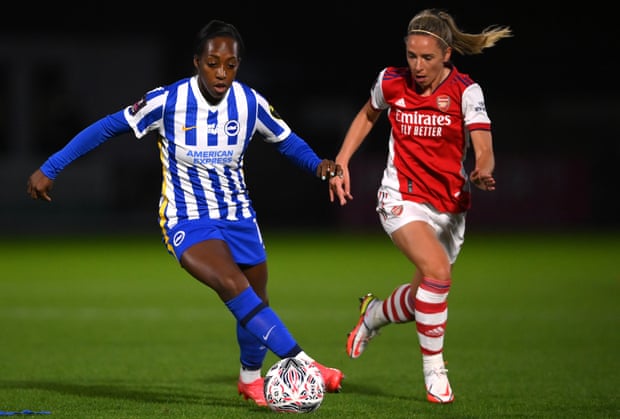
The women’s game is, undoubtedly, having a “moment”. The European Championship has caught the imagination of football fans and the wider public.
The performances of the England team have led back pages, with the Lionesses playing to primetime TV audiences and packed stadiums full of passionate fans. The comeback win against Spain was pure football drama, capped by a winning goal from Georgia Stanway that would grace any game.
Even more of the players are becoming household names. That interest will only intensify if Sarina Wiegman’s team lift the trophy in front of their home fans. All of this will, undoubtedly, create a bounce for a domestic game already growing rapidly, inspiring more people to get involved. These successes are the result of a lot of hard work, which deserves recognition.
The pace of change is why now is the perfect time for the review into the women’s domestic game that the government announced in April. The independent fan‑led review last year was an excellent piece of work that, with the government accepting its recommendations in full, can lead to real, positive change.
The review into the women’s domestic game can do the same. It provides an important opportunity to help shape its future and look in detail at a range of issues. It is crucial that players are right at the heart of this.
Along with colleagues at the Professional Footballers’ Association, I meet many decision‑makers who ask about the structure of the women’s game and the issues players raise with us. Those conversations are often marked by “raised eyebrow” moments.
Did you know that those in the men’s game receive a non‑contributory pension payment of more than £6,000 a year for the duration of their professional career, funded by a levy on transfers? No such mechanism exists for those in the women’s game, and so neither does the pension.
Did you also know that a body called the PFNCC (the professional football negotiating and consultative committee), which includes representatives from all stakeholders in the men’s game, has to sign off on any decision that would substantively change player contracts, rights or conditions? It’s a critical protection for players but no such body exists to protect players in the women’s game.
There has been some important progress. As a result of negotiations between the Football Association and the PFA, significant policy changes have been achieved relating to maternity provision, injury and illness, and the termination of contracts due to long-term injury. But much more needs to be done as we continue to push for absolute parity for those in the women’s game. Some of the recent reforms corrected eye-opening disparities. For instance, a WSL player could previously be dismissed by her club if she sustained an injury that a medic thought would stop them from playing for three consecutive months. The player would have the right only to a three-month notice of termination.
For a Premier League player, the injury would need to keep them out for 18 months in any consecutive 20-month period before their contract could be terminated, and they would then have the right to a 12-month notice of termination. These could be two players who represent the same club, working under completely different conditions.
These are the sort of issues that players care about that should be central to the review.

Players from the women’s game, including some of the most recognisable names from the Women’s Super League and the international game, are among the PFA’s most engaged and active members. They know the value of a collective, independent voice for players and they are not afraid to tell us what they want. They also see high-profile colleagues, such as Steph Houghton, Danielle Carter and Fern Whelan, leading from the front through their involvement with their union.
The PFA and Fifpro, the global union for professional footballers, are hosting players and other stakeholders from across football at the Raising Our Game event in London on Monday to discuss many of these issues. It is a timely opportunity to share experiences with organisations such as the Women’s National Basketball Players Association and to hear from those who have experienced life in the women’s game, on and off the pitch.
The review presents a chance to address a range of issues that are crucial to the future of the women’s game – protecting and empowering those who play it. It’s an opportunity that we need to make sure we don’t miss.
